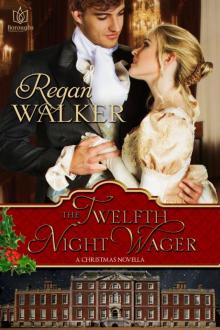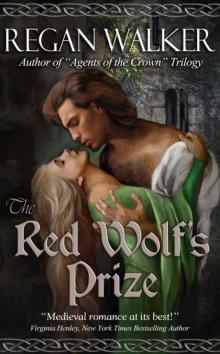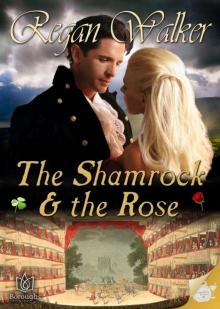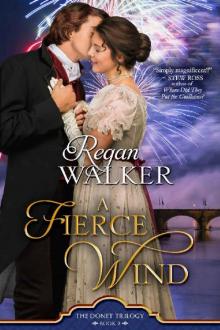- Home
- Regan Walker
The Twelfth Night Wager
The Twelfth Night Wager Read online
The Twelfth Night Wager
A Christmas Novella
by
Regan Walker
Copyright 2013 Regan Walker
Smashwords Edition
“A handsome rake, a virtuous widow, and a scandalous holiday wager. I loved the chase!”
—Nationally Bestselling Author and RITA Award–winner Kaki Warner
THE RACE BEGINS
Eustace slowed the horses and guided the phaeton to the side of the path. Holding the reins in one hand, he turned to face to her. His eyes seemed to glow in the dim light.
“I never would have thought the serene Lady Leisterfield would be so stimulated by a ride in the park. You are flushed and your eyes bright. I do think you enjoyed our dash through the Row.”
“Yes, I quite liked it,” Grace said, breathless. “Though you must admit, the ride was more like a race.”
He looked at her lips and then her neck. “I can see your pulse jumping. Perhaps you like to race as much as I do.”
Grace wondered if he was still speaking of horses or something else. Her heart sped as he leaned toward her and brushed his lips across hers. After only a moment, she pulled back.
“Too soon?” he asked.
“That question implies such is inevitable, my lord. I can assure you it is not.”
The Twelfth Night Wager
A Christmas Novella
by
Regan Walker
www.BOROUGHSPUBLISHINGGROUP.com
PUBLISHER’S NOTE: This is a work of fiction. Names, characters, places and incidents either are the product of the author’s imagination or are used fictitiously. Any resemblance to actual events, locales, business establishments or persons, living or dead, is coincidental. Boroughs Publishing Group does not have any control over and does not assume responsibility for author or third-party websites, blogs or critiques or their content.
THE TWELFTH NIGHT WAGER
Copyright © 2013 Regan Walker
All rights reserved. Unless specifically noted, no part of this publication may be reproduced, scanned, stored in a retrieval system or transmitted in any form or by any means, electronic, mechanical, photocopying, recording, or otherwise, known or hereinafter invented, without the express written permission of Boroughs Publishing Group. The scanning, uploading and distribution of this book via the Internet or by any other means without the permission of Boroughs Publishing Group is illegal and punishable by law. Participation in the piracy of copyrighted materials violates the author’s rights.
Digital edition created by Maureen Cutajar
www.gopublished.com
ISBN 978-1-938876-83-7
To all men who, like Lord Eustace, seek to escape the one thing they need the most
—the love of a good woman.
Contents
Title Page
Copyright
Dedication
Chapter 1
Chapter 2
Chapter 3
Chapter 4
Chapter 5
Chapter 6
Chapter 7
Chapter 8
Chapter 9
Chapter 10
Chapter 11
Chapter 12
Epilogue
About the Author
Author’s Notes
Synopsis
“Love sought is good, but giv’n unsought is better.”
—William Shakespeare, Twelfth Night
Chapter 1
London, January 5, 1819
Twelfth Night
It never would have happened if he hadn’t been so terribly bored that night at White’s. Staring into the crackling fire in the parlour on this frosty night and reflecting back on the last several months, Christopher St. Ives, Viscount Eustace, recalled the evening well; the deep leather chair he sat in, the lit cheroot dangling from one hand and a brandy in the other. He had only been half listening as Hugh Redgrave, the very married Marquess of Ormond, droned on about the virtues of the leg-shackled state. Happily married men could be so tiresome. Looking back on it now, it seemed years not months since they’d traded quips in the conversation that led to the wager:
“I say, Ormond, just where are you going with this praise for the wedded state? You know me too well to believe I’m convinced.”
“You might at least consider taking a wife, Eustace. There’s much to be said for the change it would bring about in your otherwise tawdry existence of late. After all, thirty-five is past the age where dissipation wears well, don’t you think?”
Tawdry existence? Dissipation? “Surely you cannot mean those words, Ormond. I’m just after a bit of fun.”
“You go after women like you go after the fox. It’s all in the chase for you.”
“And that is wrong? Just because you have your heir and a spare at thirty-two does not mean I wish to accumulate the same baggage.” At the frown that appeared on Ormond’s face, Christopher, Lord Eustace, hastened to add, “No offense meant toward the beautiful Lady Ormond, whom I admire above all women, but I am not ready for such a change, as my recent indulgences confirm. Besides, I like women and have my own way of handling them, which suits me quite well. I see no reason for change.”
“As far as I can see, your way of ‘handling’ them is not to have one at all.”
“Ho, now that ain’t so, and well you know it! Though, being a gentleman, I’ll not disclose the number ‘had’ even if I could recall. My method, I assure you, works perfectly for me.”
“You have a method?” Ormond asked, incredulous.
“Well, perhaps not a method as you would count it. I seduce ’em, bed ’em and—”
“Leave them. Yes, I know. But not always smiling, I’ve heard.”
Christopher looked up at the chandelier above and back to his friend as he let out a sigh. “Perhaps not, but none complain till the end is in sight. Then, well…I admit things have on occasion become a bit sticky. But they are all willing players in the game.”
“Your way of handling women cannot work with all. You must have failed with some.”
“Quite the contrary, my good man. I’ve succeeded with every lady I’ve gone after.” Christopher held back a grin. He did not lack confidence when it came to his success with women. And a worthy adversary made every game more exciting.
“I would wager there is one you cannot seduce.”
“Ho! Wager? Do I hear a challenge being laid down?” Snuffing out his cheroot, Christopher leaned forward. “Who might this unassailable paragon be?”
Ormond glanced about the sparsely populated club room filled with tables and chairs. Christopher’s eyes followed, noting the small group of men at a round table engaged in muted conversation some distance away. None appeared to be eavesdropping.
Leaning forward, Ormond whispered, “Grace, the Lady Leisterfield.”
Christopher leaned back in his chair and took a sip of brandy. In his mind’s eye he saw a slim blonde in a rather modest gray gown standing next to the elderly Lady Claremont. “Yes, I recall her from the last ball of the Season. The young widow lives like a nun, or so I’ve heard.”
Ormond grinned. “That, old man, is the challenge.”
“She’s in mourning, is she not?”
“Just coming out. And a worthy contender to test your…method.”
“I see.” But did he? Was there more to this than a wager? It was clear Ormond had something in mind, and the marquess could be exceedingly cryptic at times. Still, whatever was behind the challenge, and whatever the stakes, Christopher was drawn by the opportunity, even more by the encouragement, to entice the lovely Lady Leisterfield to his bed.
“I’ve been very impressed with the lady,” his friend continued, “and I would love to
see you fail miserably trying to scale her castle walls. I would consider it sweet justice for the fairer sex.” Ormond winked.
Christopher was tempted to decline, still miffed at Ormond’s comment about his tawdry existence. Yet the memory of the beautiful Lady Leisterfield permeated his thoughts. “Perhaps I shall accept your delightful challenge.”
Ormond grinned, then his expression turned serious. “One thing. If you do this, Eustace, you must promise to preserve the lady’s reputation no matter the outcome. That must be part of the challenge, as I would not see a good woman ruined at the end of it.”
“Well, I know of no woman who has suffered overmuch from being associated with me, but I assure you I will be discreet.”
“All right—and so we are clear,” said Ormond. “You must seduce, bed and walk away from the baroness, else I will have won.”
Christopher nodded, wondering all the while if he’d missed something. Ormond always seemed to have an agenda not fully disclosed. With him, much was hidden beneath the surface.
The marquess suggested with a pointed look, “Ninety days should be sufficient; do you agree?”
“We are indeed agreed. And let me add, it will be my pleasure.”
It wasn’t just the thought of bedding the lovely widow that put a grin on Christopher’s face; he was thrilled with the prospect of a real challenge with a virtuous woman. It was a wholly different sport than he normally engaged in, but Lady Leisterfield was a worthy quarry. A challenge indeed. One for which he felt himself uniquely qualified.
“Shall we reduce the wager to the book?” Ormond inquired with a wry smile. “Say, one thousand pounds to make it interesting?”
“Done.” Casting his reservations aside, Christopher set down his empty glass, reached for Ormond’s extended hand and gave it a hearty shake.
And so, that night, Christopher entered the following into White’s book:
LD EUSTACE HAS WAGERED LD ORMOND 1000 POUNDS
THAT BY TWELFTH NIGHT HE CAN SEDUCE, BED AND WALK AWAY FROM A CERTAIN LADY UNDERSTOOD BETWEEN THEM.
* * *
It wasn’t long before the entry in White’s wager book became the talk of London society, lords and ladies alike speculating on just who the “lady understood” between Ormond and Eustace might be. The trouble, it seemed, was that Eustace was seen with so many women that no one had any idea. Then, too, it was suddenly popular to be one of his dance partners, as if every woman in the ton wanted to be the subject of the wager. Hugh, Lord Ormond, was feeling quite pleased with himself, assured he would win—that was, until he happened to remark of it to his wife in their bedchamber.
“You did what?” Mary tossed the words at him with a disbelieving expression.
“I told you days ago, love. Eustace and I made a wager.”
“Yes, but you conveniently forgot to mention it was that wager! Why, it’s all over Town. Who is this woman who is now unhappily the object of the Redheaded Rake’s unwanted attention?”
“‘Redheaded Rake’? Do they really call Eustace that?”
“They do in my circles. He may be the most eligible bachelor in the ton but the price for a try at him is high. So, I ask you again, on whom have you turned him loose?”
“You won’t tell?”
“That depends on the woman, Hugh. I might know her!”
Observing closely, Hugh could see that his wife, the former Lady Mary Campbell, a bluestocking hoyden in her own right, was in a pique. There would be no denying her the information she sought, though it seemed ill-advised if he was to win the wager. “All right, but I have sworn Eustace to discretion so you must be discreet as well. The woman is Lady Leisterfield.”
“My good friend! How could you?”
“It’s really a compliment to her, sweetheart, if you’d but stop to consider. I know well from all you have said of her that she is a virtuous woman who would be indifferent to Eustace’s many charms. I merely wanted to set him down while seeing Lady Leisterfield have her victory.”
“Why am I having trouble with this whole idea?” Mary gave him a quizzical look. “I sense something is amiss.”
Her piercing green eyes focused on him, and Hugh was not immune. When his wife looked at him with such searching intensity it was hard to think straight.
“Aside from that,” Mary continued, “Grace has only been widowed a year, and though I concede the old Lord Leisterfield couldn’t have been much of a lover, he was very kind to her and she was fond of him in a distant sort of way. She doesn’t need the most accomplished rake in London on her trail just coming out of widow’s weeds.”
Leaning in for a kiss and inhaling deeply of his wife’s scent of gardenias, Hugh resisted a smirk. He had the advantage of superior knowledge and a plan he was sure would succeed. “You must have more confidence in your friend, sweetheart. I do.”
Mary placed her hands on his shoulders, bringing her enticing body against his. “I think she must be warned, darling.”
Nibbling at her ear, he would agree to anything. “If you say so, my love.”
* * *
Grace dressed for the theatre, her spirits rising as her maid slipped over her head a sapphire gown that was the color of her eyes. Smoothing the glimmering silk, she gazed into the standing mirror, pleased with the new purchase, the first in a year except for her mourning gowns. The sapphire creation was the latest fashion, with gold embroidery on the flounce at the hem and across the bodice. A matching gold and sapphire shawl lay across her bed.
“Now that’s a fine sight, my lady. Though, with your fair hair, the men no doubt thought you fetching even in gray and black. Still, I’m glad to see you shed those drab colors.”
“You are right, of course, Hawkins.” Grace could not stop the smile she gave her lady’s maid. The dear woman had been with her since before she’d married the baron. “It’s time to set aside the gowns of mourning for brighter fare. The gray ones of half mourning were worse than the black and the purple on me. But I gladly wore them to show my respect for his lordship.”
“Well, it did simplify dressing. No choice at all is an easy one. Still, it seems right to be done with them. The old lord was a good man, and were he still alive he would approve the change.” The lady’s maid draped the shawl over Grace’s shoulders. “Will you be returning directly after the theatre tonight?”
“Not directly, no. My friend Lady Claremont is collecting me on her way to the Sans Pareil, and she’s invited me to have a late supper with her and Lady Picton after the performance.” Adding to her string of pearls the sapphire pendant her late husband the baron had given her on their last Christmas together, Grace glanced in the mirror once more and then descended the stairs.
Smithson was waiting near the front door. “May I get you anything, my lady? The carriage?”
Grace cast a fond look at the old butler who had served the baron for the last twenty years of his life and now faithfully served her. He had been a great help when her husband died. “I won’t require the carriage tonight, as Lady Claremont is coming for me. But I would like a glass of sherry, perhaps.”
Smithson nodded. “Very well.”
“Could you see it is brought to me in the parlour? I’ve a bit of time before the countess arrives.”
“Yes, my lady.”
A few minutes later, standing in front of the stone fireplace, Grace took a sip of the amber liquor and sighed. Tonight was her coming-out in a manner of speaking. She’d attended only a few balls in the last Season, and her other entertainments had mostly been dinner with friends. But tonight would be different.
She lifted her glass in toast to her late husband and gazed at his portrait. “Here’s to you, Charles.”
He’d been a young baron when the picture was painted, long before she knew him. His vibrant brown hair tied in a queue and poppy-colored velvet coat and breeches seemed incompatible with the faraway look in his eyes as he stared off into the distance. She had seen that same look on his face as an older man—a man of so
me mystery, whose thoughts she’d often found difficult to discern. It had always seemed to Grace that he was more enamored with his plants than with her. Perhaps that had been what consumed his thoughts while the artist worked. The baron had often left her alone to venture off on some horticultural pursuit, so that when he died she was only a little more alone than before.
Alone. Grace sighed again. With her father’s last dying breath, he had bought her a title. Grace often wondered, as she did now, if it had been worth the money. Still, she could not complain. The baron had indulged her every whim—though, truth be told, they’d been few. Now, at twenty-five, she had made good friends among the women of the ton and enjoyed the confidence of many, though she participated more in children’s charities than in soirées. On the rare occasions he was in Town, Charles had preferred to spend his nights at home. She’d never objected, content to take a book to bed as her husband labored over his cataloging of new plants.
Until he had left for Eton, David, Charles’s only son, had filled their home with laughter. He was the child of the first Lady Leisterfield, who had died when the boy was quite young. But what a special boy he was, now a young man. Grace could not have loved him more had he been her own, though at fifteen he was more like a younger brother. She had come to look forward to their Christmases together when he was on holiday from school. Soon, she thought, the young Lord Leisterfield would take his place in the world.
With both Charles and David gone, the house felt empty and she was admittedly lonely. Hence, it was with great anticipation she greeted the upcoming evening at the theatre.
Chapter 2
The Sans Pareil Theatre was crowded for the opening of the Season. Following Lady Claremont, Grace made her way through the crush to take her seat alongside the dowager countess in their second tier box. Gazing around at the ladies attending, she was pleased she had worn the new gown. The entire ton, it seemed, was decked out in most elegant fashion.
Lady Emily Picton, the widow of the Waterloo hero Sir Thomas Picton, shortly joined them in a rustle of silk skirts. The three widows were good friends, and Grace enjoyed their outings. Their friendship meant much.

 Summer Warrior (The Clan Donald Saga Book 1)
Summer Warrior (The Clan Donald Saga Book 1) Echo in the Wind
Echo in the Wind Once Upon a Christmas Past
Once Upon a Christmas Past A Secret Scottish Christmas (Agents of the Crown Book 4)
A Secret Scottish Christmas (Agents of the Crown Book 4) The Holly and the Thistle
The Holly and the Thistle Racing with the Wind (Agents of the Crown)
Racing with the Wind (Agents of the Crown) Wind Raven (Agents of the Crown)
Wind Raven (Agents of the Crown) Rebel Warrior (Medieval Warriors #3)
Rebel Warrior (Medieval Warriors #3) King's Knight (Medieval Warriors Book 4)
King's Knight (Medieval Warriors Book 4) The Twelfth Night Wager
The Twelfth Night Wager The Red Wolf's Prize
The Red Wolf's Prize The Shamrock & the Rose
The Shamrock & the Rose A Fierce Wind (Donet Trilogy Book 3)
A Fierce Wind (Donet Trilogy Book 3) Against the Wind (Agents of the Crown Book 2)
Against the Wind (Agents of the Crown Book 2)